
Put simply, Larry Lipsher has led a full life. And continues to.
Lipsher describes himself as a “full-time curmudgeon, long-time rice-counter, cynical stand-up comedian, and semi-retired author of the best bleeping tax books and essays you ever will find!”
But there is much more. He is, after all, one who:
- Was an accountant and tax planner for major rock music groups and some baseball notables
- Had dealings with countless rock stars, including the Rolling Stones’ Mick Jagger
- Shared a joint with Jerry Garcia of the Grateful Dead at an opera
- Is a recovering cocaine addict who quit cold turkey
- Helped stage large rock concerts featuring well-known acts
- Almost became the owner of a minor-league baseball team
- Holds two master’s degrees
- Raised sheep for several years in northern California
- Solved a mid-life crisis following a divorce by moving to China in the early 1990s
- Became the first Westerner in China to get a business license as an accountant
- While in his mid-60s, threw batting practice for a Chinese baseball team
- Has written several successful books about taxation that the average person can actually read and understand
- Was a partner in a karaoke bar, pizza joint, and restaurant in China
- Survived a bout with bladder cancer
- Served as president of the American Chamber of Commerce of South China, a position which got him an invitation to deliver a presentation in the Great Hall of the People in Beijing – just like Mao and other Chinese leaders
- At 79, is still doing tax work on a full-time basis
And he’s also a JapanBall Hall-of-Famer.
“All our lives seem really boring compared to Larry’s,” fellow Hall-of-Famer Leon DeHaven says dryly of the accountant whose star-crossed past resembles that of Forrest Gump.
But perhaps a different famous comparison is better suited. Paul Barnes, another JapanBall Hall-of-Famer, believes that “Larry must have been the prototype for ‘The Most Interesting Man in the World.’ He’s very much a storyteller and raconteur. His own story is fascinating.”
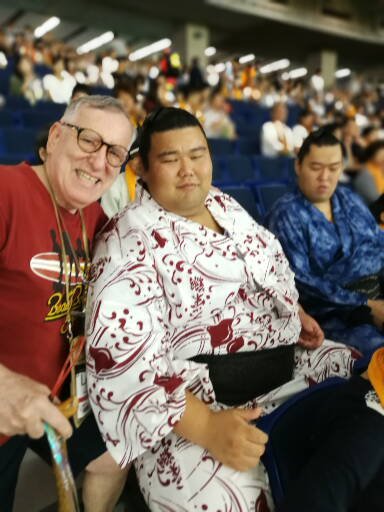
Dodger Blue from Day One
The tale begins in Brooklyn, where Lipsher was born in 1942. Living just a mile from Ebbets Field, home of the Brooklyn Dodgers, he attended his first game at age two and saw Jackie Robinson play during his rookie season. His father worked for a bank next door to the Dodgers’ offices, and would often see owner Walter O’Malley and General Manager Buzzie Bavasi at the coffee shop across the street.
“My father loved baseball as much as anyone could, and he took the family to my first game in 1944, but the first one I really remember was on September 18, 1947,” he recalled. “It was the morning game of a doubleheader. Johnny Sain of the Braves beat Preacher Roe, and I saw Robinson play for the first time. After that, I had an agreement with my father – anytime I wanted to go to a game, he would pay for a bleacher seat. I spent many an afternoon at Ebbets Field, and we had tickets to all 13 night home games, too.”
The cost of that bleacher seat? 25 cents. Not a bad deal for his father.
The Ebbets Field fun ended, of course, when the Dodgers left New York for the west coast following the 1957 season – a “trauma,” Lipsher calls it. Two years later, though, he moved with his family to Los Angeles. He was elated to once again be in the same city as the men in blue, but he encountered a completely different ballpark experience.
The Dodgers played their first four seasons in the Los Angeles Coliseum, which was not built for baseball and therefore had an odd configuration – only 300 feet down the right field line, an immense 440 feet to right-centerfield, and a mere 250 feet to the left field wall, which compensated for its short distance with a 40-foot screen atop it. Lipsher fondly remembers how skilled Dodgers outfielder Wally Moon was at playing balls off the screen.
The club then moved to brand-new Dodger Stadium in 1962, which was a relief to baseball purists like Larry.
“What an opposite edifice compared to Ebbets Field. There was even an orange grove in one of the parking lots!” exclaimed Lipsher.
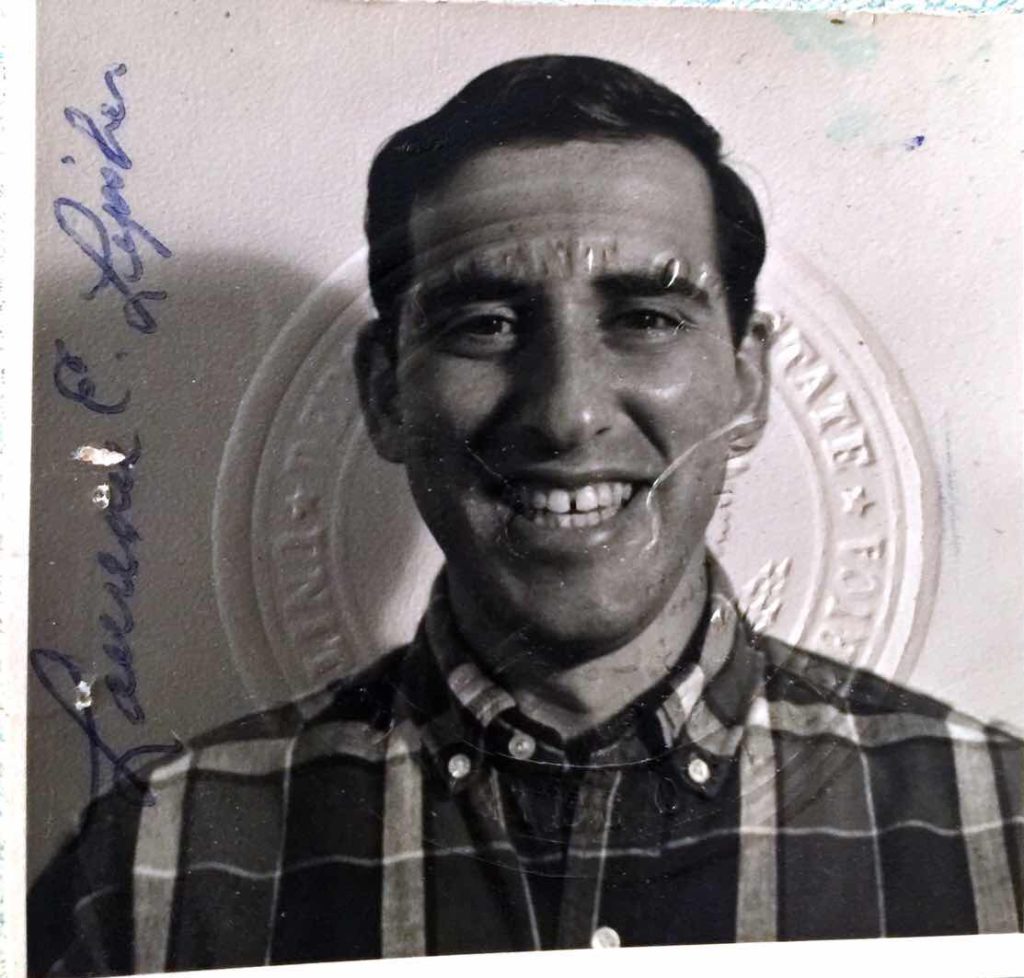
He was politically active during the turbulent 1960s, working on the floor at the 1960 Democratic Party convention in Los Angeles and participating in the California Federation of Young Democrats.
He also matriculated at the University of California – Berkeley, earning a degree in philosophy, but quickly realized that philosophy was great for dinner-party conversation but not for making a living. He became an accountant and earned two graduate degrees, one of which was an MBA with a specialization in the Far East that nurtured his interest in that part of the world.
“I started at Berkeley in metallurgical engineering and hated it,” he said. “I liked playing bridge better. After graduating, I listened to my mother and became an accountant. I didn’t like it that much, but I realized I had an ability to put tax matters into down-to-earth language.”
Lipsher began working for an import/export company in the garment industry and eventually became its controller. After receiving his MBA, he joined the Army Reserves to fulfill the military draft obligations in place at the time, married in 1967, and had three children. He worked for an accounting firm during the day, had a part-time evening job, and later began a night graduate program in accounting with a specialty in taxation.
“I moonlighted in the area of entertainment industry accounting and business management while working for a local CPA firm to get my mandatory experience requirement out of the way,” he said. “There were few specialists in entertainment industry accounting at the time, but there was one New York firm that I did occasional freelance work for.”
Accounting for the Rock Star Life
Lipsher opened his own firm in 1972, specializing in the business, tax, and financial management of bands. The firm attracted clients such as The Moody Blues, Pink Floyd, The Grateful Dead, and Rick Springfield while also helping to stage large concerts and getting involved in musically oriented Hollywood films. Lipsher handled, for example, the music royalties for the Barbara Streisand/Kris Kristofferson version of A Star is Born.
Separately, in a side gig as a California Probate Referee, he was involved in settling the estates of luminaries such as Roy Disney, Bing Crosby, John Wayne, Groucho Marx, and John Paul Getty. Coming full circle from his childhood, he even settled the estate of Walter O’Malley.
In short, it was a go-go decade filled with enough stories to fill volumes – even if he were only to tell the innocent ones. “The stories I’d love to tell are ones I can’t,” he said wryly. “The people are still alive, and I couldn’t afford the [ensuing] litigation.”
One day in 1974, he got a call saying that the American rhythm-and-blues group The O’Jays was stranded in Canada because Ontario provincial officials wanted 50% of the revenue from a just-completed concert. Did Lipsher know anything about Canadian tax law? The honest answer was “no,” but his answer was “yes.” He found a loophole based on an obscure treaty, flew to Canada, and negotiated the deal down to 15%.
On another occasion, he arrived at the Warner Bros. studio, couldn’t find a parking spot, and decided to take actor Steve McQueen’s reserved spot because McQueen, he was told, rarely showed up. Naturally, “The King of Cool” showed up this time.
“He came in kind of irate, and I said, ‘I’m the one who parked in your space – I decided that today I wanted to be Steve McQueen. But that’s OK because today you get the chance to be Larry Lipsher.’ There was silence for a moment, but then he broke into a grin. Later on, we got to be commissary coffee-break buddies.”
Another client owned an apartment near Central Park in New York that he occasionally rented to Mick Jagger. “I was the ‘rental agent’ when my client was traveling, so I spoke with Jagger several times, and I can tell you that the private Mick Jagger and the public Mike Jagger are very different. He had a very pleasant private persona.”
Lipsher worked with actor/singer Rick Springfield and played a small role in the singer’s first hit album.
“Rick was with RCA, and his album was scheduled to be released the same week as one by Cheap Trick, which was much more well-known,” Lipsher recalled. “I argued that we should delay the release of Rick’s album so we’d be able to get more attention. We ended up releasing it six weeks later, and it went platinum. I still have a framed copy of the album.”
Lipsher was also exposed to the dark side of the go-go ‘70s, and the lifestyle that often engulfed celebrities and their associates. “Clubs, arenas, and stadiums at night – wearing jeans and T-shirts – were as much a part of my business as wearing suits and ties at alcohol-fueled lunches with bankers and attorneys.”
He recalls the time he saw the son of a well-known politician at a concert – holding a spoon and vial of cocaine and with security people looking the other way.
Another time, he was working on a movie that included a scene in which the script had the star using cocaine. The star demanded that to be realistic, they use the real stuff. Lipsher was asked to find some, which he did.
Lipsher, already a heavy marijuana user, says he was “introduced to cocaine” in the early ‘70s and was a heavy user by 1975. The combination of constant work and drug use took a toll on him and his family life.
“We had three children, but, regretfully, I was not around to watch them grow,” he acknowledged. “I was rarely at home, in part because the music business was a night-time one, but also because the work ethic of the time was for the breadwinner to make bread, not be at home and share responsibility for raising the family. I bought into that big time. I was doing quite well financially, but there’s far more to life than just making money.
“Plus, I was an addict unwilling to admit it. It was a reckless, fast track to destruction – and, to prove it, I have no nasal membranes left. I can’t account for much during the latter half of the ‘70s. It was a nightmare life for a half-dozen years before I was willing to recognize that I was addicted.”
Unlike many, he was able to quit on his own. It was tough, but he did it – “I still occasionally wake up in a cold sweat, desirous of coke,” he admits. “It’s a very physical thing that never really goes away.
“By 1980, I knew I had to get out of Los Angeles,” he said. “If I stayed in sports and entertainment, I’d fall back. I was a business success but was living a bankrupt life, failing miserably as a husband and parent. I told my three partners and 50 staff members that I was walking out – that I couldn’t take it anymore.
“We left L.A. on April 11, 1981. I presented my family with the cold, hard, self-serving fact that I had to get out of the Southern California that had dragged me to the depths of cocaine addiction. In retrospect, I handled it badly. I never asked them if they wanted to move; I just said, ‘Let’s get out of here,’ and that was that.”
From the City of Angels to the Farm of Sheep
Looking for a change of pace, Lipsher and his wife found a three-acre property in northern California’s Sonoma County and decided to raise sheep. Except for a few athletes such as Frank Robinson and Reggie Smith – he helped negotiate Smith’s contract with the Yomiuri Giants – Lipsher dropped his sports and entertainment clients and gradually replaced them with ones from the wine industry.
As for the sheep . . . well, that was an experience in its own way nearly as trying as his rock ‘n roll past.
“The only thing dumber than sheep is the person raising them,” Lipsher says. “They were great consumers of hay, oats, weeds, and virtually every green thing on our land. Seemingly, they only gave birth on the coldest, rainiest nights, at the furthermost points of our property, and away from any shelter. I would hold the mother while my wife – a nurse – pulled out the lamb. After five years, I’d pretty much had it.”
But before leaving the agricultural life, he met Grateful Dead drummer Mickey Hart, who purchased a nearby sheep farm. Lipsher showed Hart some of the basics of raising sheep, such as how to dock lamb tails and castrate the males. By then, Lipsher had a “nodding acquaintance” with most of the Grateful Dead members and later had the moment with frontman Garcia that “Dead Heads” dream of.
“My wife and I had season tickets for the San Francisco Opera, and Jerry was sitting two rows in front of us on this particular night. He was wearing dress pants and an open-collared dress shirt, while I had a three-piece suit and a Grateful Dead tie with dancing bears on a field of navy blue. A few days later, the Dead had a performance scheduled, so I told him, ‘We’ll both be wearing something different two nights from now, won’t we?’ At the end of the second act, I asked him if he wanted to join me for a doobie in one of the tunnels of the auditorium, and he did.”
A few years later, Lipsher had another memorable opera-related experience. He attended a performance in the Bavarian town of Bayreuth, Germany. His wife, not a fan of opera, did not accompany him. As it happened, England’s Prince Charles was also there. During an intermission, Lipsher strolled through a nearby park and noticed Charles – also by himself – walking toward him.
“As we were close to one another,” Lipsher recalled, “I said, ‘Sir, you are not alone – my wife can’t stand opera, either!’ He actually laughed, and then his bodyguards whisked him away.”
Politics also helped fill Lipsher’s days during the 1980s. He helped coordinate the congressional re-election campaign of Barbara Boxer, later a U.S. Senator from California, and eventually ran for the board of the local hospital district. He lost by 137 votes and, upon reflection, was glad – “after three months of saying inane, innocuous, irrelevant things to people I’d otherwise never have associated with, I got the political bug out of my system.”
He didn’t lose the baseball bug, though. As mentioned, he’d retained a few baseball clients and met others through them. Reggie Smith was with the Dodgers, so Lipsher got to know LA manager Tommy Lasorda. “I happened to have been at the game when he made his playing debut [with the Dodgers in 1954] and still had the scorecard from it, so I gave it to him.”
Closer to home, he and his friends followed the Oakland A’s and San Francisco Giants, attending games whenever possible. He was also part of a group that nearly bought the Redwood Pioneers minor-league club, which played in the California League from 1980-85. However, the deal fell through when the group was unable to work out a stadium agreement.
Unfortunately, by 1990, his marriage had also fallen through, and the question he faced was what to do next?
The answer was, “move to China.”
From the Bay to Beijing
Lipsher had been interested in Asia since taking a college class about China in the early 1960s and reading Edgar Snow’s book, “Red Star Over China” (interestingly, he eventually became the accountant for Snow’s widow and her family). He made several work-related trips to China in 1988 and 1989 and finally decided to move permanently.
“It was a weird manifestation of a mid-life crisis,” he acknowledged. “I left the Bay Area for China with my proverbial tail between my legs. I was leaving without anything and abandoning a way of life – admittedly, one that wasn’t working – for complete uncertainty halfway around the world.”
In the long run, though, it has certainly worked out. Lipsher developed a tax practice from scratch in Hong Kong, working with smaller, mostly American clients that the large firms overlooked. He began writing a series of books about taxes, inserting humor and language that the average person can understand. He even was featured in an Asian Wall Street Journal article (“An American Accountant Caters to Fringe of China Export Boom” – 4/26/1993).
“It took five years to develop a tax practice for the third time in my life. Praise be to usurious credit-card interest that kept me alive,” he said with a laugh. “Until my China-Hong Kong business started paying for itself, I could not have existed without credit-card loans. It was five years of borrowing and then seven more to pay off the loans.”
A couple of years in, he met his current wife, who was then a translator and administrative assistant at the U.S. Consulate. They had a daughter, Joanna, and he proudly became the first husband ever permitted into the birthing room of the hospital where she was born. Joanna now works in Tokyo as a patent engineer for a cosmetics company.
Along the way, he survived cancer, quit drinking (“I gave up Jose Cuervo and all his alcoholic relatives”), thoroughly embarrassed 10-year-old Joanna with his dancing at a Deep Purple concert in Guangzhou, China, and wrote articles for the official publication of the Chinese Institute of CPAs.
And how many tax accountants can say they’ve pitched batting practice for a professional baseball team while in their 60s? Most likely, just one.
“The Guangdong Leopards were in the China Baseball League,” Lipsher said. “There were many games at which only four people attended – two Japanese scouts, a Korean scout, and me. I was there enough times that they asked me to pitch batting practice, and I eventually taught the China Baseball Federation how to keep score leading up to the 2008 Olympics.”
A JapanBall Favorite
Lipsher’s first JapanBall experience was in 2012, when he turned 70 and did the “See-it-All” tour (attending games at all 12 NPB ballparks) to earn his ticket into the JapanBall Hall of Fame.
“I did the trip as a birthday present to myself, and I celebrated the actual day at the Sapporo Dome. A cousin had sent me four boxes of Cracker Jack, and we took them to the game. As we left, people were high-fiving me because they knew it was my birthday.”
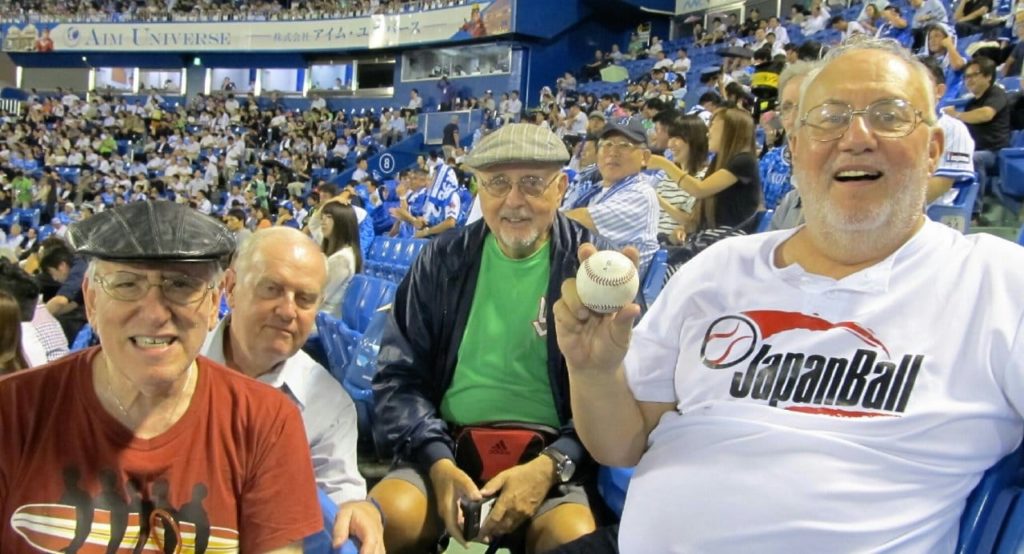
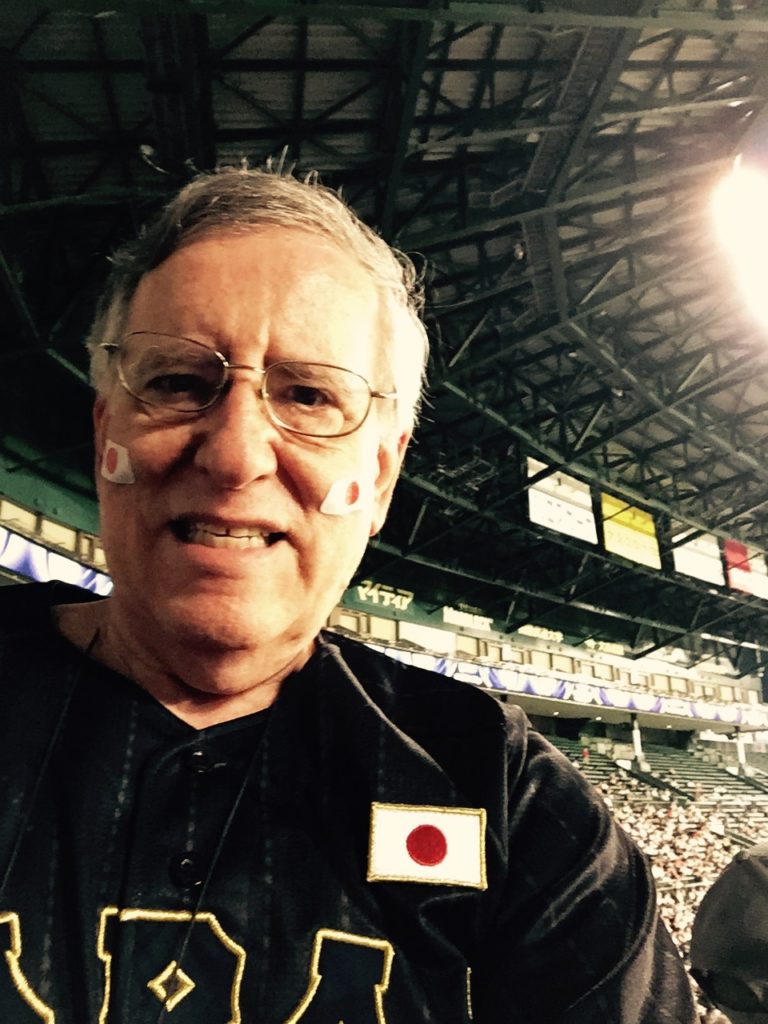
He’s since done additional JapanBall tours and also informally joined tours when visiting his daughter in Tokyo.
DeHaven, a veteran of more than a dozen JapanBall tours, recalls he and Lipsher going to a department store owned by the Hanshin Railroad, which owns the Hanshin Tigers team of the Japanese Central League.
“There’s a whole floor of Hanshin Tigers stuff, and we’d go there and buy a bunch. The last time, Larry bought all 20 of the ashtrays they had,” DeHaven said. “Another time, he bought a couple of the Japanese happi coats and wore them to games.”
Lipsher adds that he has a personalized Tigers uniform, ready for cosplay – “The local fan reaction has been great . . . and why shouldn’t I get into the local fun of going to a ballgame?”
JapanBall founder Bob Bavasi remembers Lipsher at his finest at Meiji Jingu Stadium, home of the Yakult Swallows.
“He was looking for a cover photo for his newest tax book,” Bavasi said. “As we were walking around the stadium, Larry saw the Yakult cheerleaders behind a rope line, jumped into the midst of them, and got a photo taken. That was his cover shot. Larry is always doing things that bring smiles to people’s faces. He creates memories.”
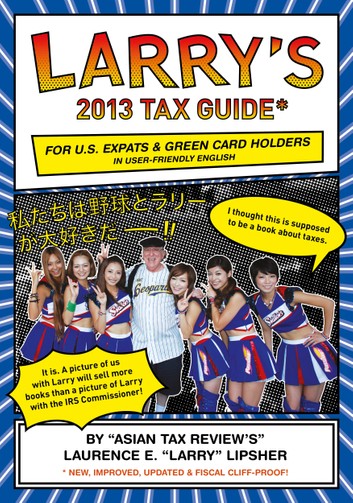
One that gets a laugh from Barnes is when Lipsher and his family were preparing to attend a Grateful Dead concert. He wanted a medical marijuana prescription, and the conversation went like this:
- Doctor: “What do you need this for?”
- Lipsher: “Anxiety.”
- Doctor: “What do you mean, exactly?”
- Lipsher: “I’m afraid you won’t give me this, and I’ll be completely sober for the concert.”
He got the prescription.
Another time, he was preparing for a colonoscopy and had just consumed the last of the necessary liquid electrolytes that intended to – ahem – clean him out. Just then, the fire alarm in his Bangkok high-rise went off, and all the residents had to leave the building immediately and wait a couple of hours before the fire was extinguished. Lipsher could only, well, hold it.
“I later wrote a letter to the English-language newspaper thanking the fire department personnel for escorting us down 13 flights of stairs and out of the building. They were very polite but had no idea of the agony I was in,” he said dryly.
He and his wife have made Bangkok a winter destination since 2013 and will be there until Covid-19 loosens its grip and they’re permitted to return to Hong Kong.
“I grew up envious of rich neighbors who went to Florida for the winter,” he said. “Now, Bangkok is our Florida.”
Lipsher still does tax work full-time and follows baseball religiously.
“I have baseball on every morning,” he said. “I don’t know how I would exist without MLB.TV. There are two laptops on my desk – one for work and one tuned to MLB, the NBA, rock concerts, or opera. I go into a funk from the end of the baseball season until March.
“I stay plenty busy. The word ‘retirement’ is not part of my vocabulary. You can’t change whatever you’ve done in the past. Tomorrow? Who knows – it’s out of our hands. So live for today . . . and to the fullest.”
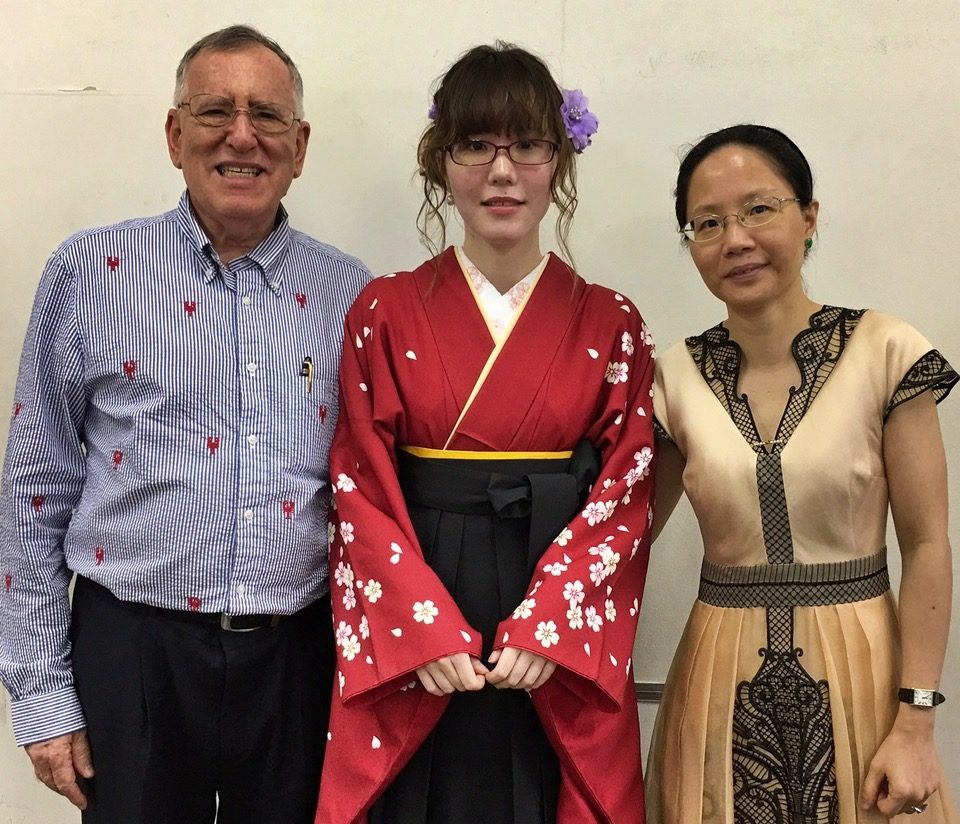
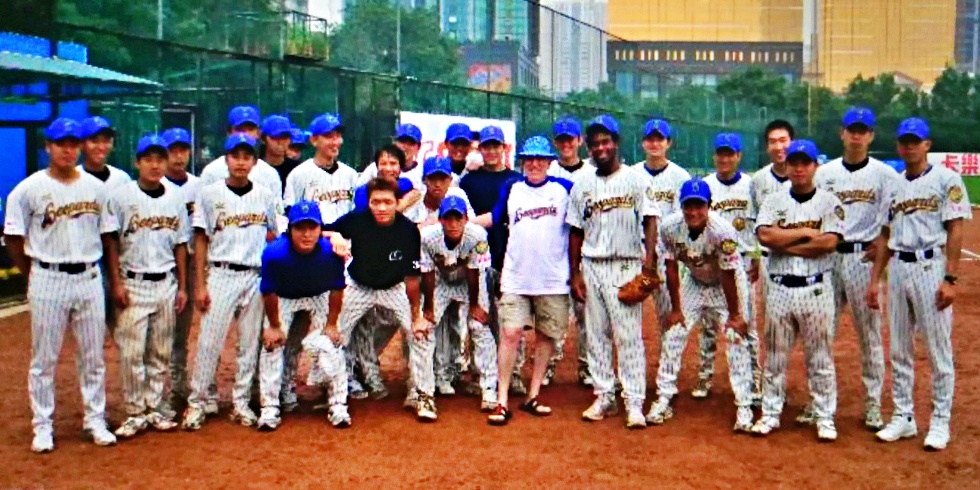
2 comments
Loved the column about Larry Lipsher. Had the honor of sharing several Japan Ball adventures with him. What a guy!!
What a guy, indeed! You and Larry: two JapanBall legends!